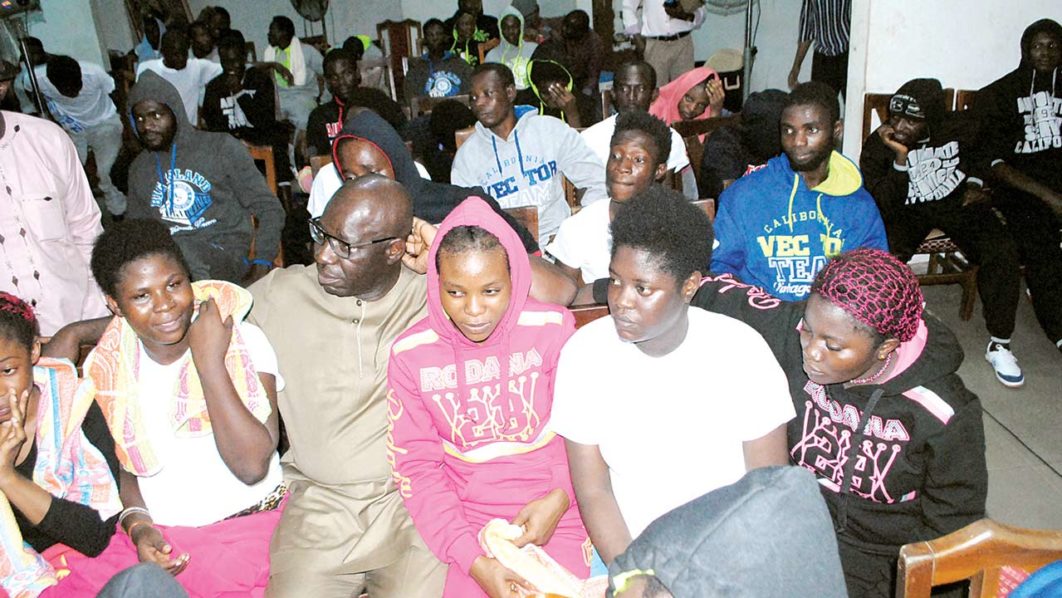
The notion that the grass is always greener on the other side of the fence daily lures many young Nigerians to embark on the dangerous journey of migration through the desert to Europe through North Africa, where they face violence, exploitation and abuse along the Central Mediterranean route.
But now back home, some returnees lucky to be alive, say it is always not greener. A returnee from Libya, Rescue Esosa, said she was glad to return home and be reintegrated into the society in Edo.
“I am glad to return home and start my life again in Nigeria after all the troubles I went through in Libya in search of greener pastures. The pain and experience I went through trying to cross over to Italy were unbearable. I lost my friends to the desert and some at sea. I had better stay and invest in my country than risk my life in the hands of smugglers. I am glad to have something doing now,” she said.
Another returnee said she decided to leave Nigeria without the knowledge of her husband because of hard life, as her husband could not care for her three children. She left Nigeria with the help of a woman she paid money in Libya. The returnee said she left with a pregnancy and she tried to abort the pregnancy about six times while on the journey but it failed.
“I gave birth to twins, the boy died, while I brought back the girl. It was the greatest mistake of my life but I am happy to begin again with new hope.”
The United Nations High Commissioner for Refugees (UNHCR) report states that 70 per cent of people irregularly migrating from Nigeria are from Edo. According to UNHCR’s Senior Liaison Officer, Amah Assiama-Hillgartner, during the agency’s Telling the Real Story (TRS) meeting, she described Nigeria as the country of transit and trafficking of irregular emigrants.
“The data available to us show that a lot of the departures who claimed to have left from Nigeria reveal Edo as their state of origin. Edo State seems to be the centre or one of the bases for processing for people to leave Nigeria.”
Since April 2017, some 16,102 stranded migrants, including 1,200 victims of trafficking, have voluntarily returned to Nigeria as part of the EU-IOM Joint Initiative for Migrant Protection and Reintegration. About 35 per cent of these returnees said better employment opportunities were their main reasons for leaving.
To address this problem, a professor of History and International Studies, who is also Dean of Students’ Affairs at the University of Benin, Benson Osadolor, recently called for a national policy intervention, youth civic engagement, and mind management for creativity as effective measures to address youth migration.
In tackling the menace of human trafficking in Edo State, Governor Godwin Obaseki has made rehabilitating and reintegrating of those rescued by the National Agency for the Prohibition of Trafficking in Persons (NAPTIP) a priority to restore dignity to the vulnerable and abused.
At least, over 6,000 returnees have been received by the state government. On arrival, they were provided with initial accommodation before reintegrating them with their families, after introducing the returnees to entrepreneurship and farming initiatives in the bid to dissuade youths from the state in going the Libya route.
To set the ground work for this, the governor set up the Edo State Taskforce Against Human Trafficking (ETAHT) enabled by the Edo State Trafficking in Persons Prohibition Law (2018), which provides an effective and comprehensive legal and institutional framework for the prohibition, prevention, detection, prosecution and punishment of human trafficking and related offences.
The initiative is already bearing its desired fruit. On August 15, the state received and reintegrated 18 indigenes of the state, made up of 17 young girls and a year-old male child, who were stranded in Mali. A physically-challenged returnee from Libya, who has established a tailoring outfit in Benin City after his reintegration, Frank Obeahon, said getting something to do in one’s fatherland was better than traveling abroad because some people die in the process of trying to migrate illegally.
“The truth is that people consider traveling out of the frustration they are facing in the country. If they are engaged through employment, a lot of people will jettison the idea of traveling out for greener pastures. Traveling through these routes is an issue of life and death and the chances of getting to the destination are 50-50 because a lot of people die in the process,” he said.
Receiving the latest batch of returnees, the state Attorney General and Commissioner for Justice, Prof Yinka Omorogbe, said the administration had, in the last three years and eight months, stemmed the scourge of illegal migration through massive investment in the education sector, in addition to creating various empowerment programmes for the youths.
To ensure that the returnees are fully reintegrated and kept busy, the state government, in collaboration with the International Organisation for Migration (IOM), opened a pineapple factory operated by a business cooperative, involving returnees and unemployed youths, and the private sector as part of the IOM’s integrated approach to sustainable reintegration.






